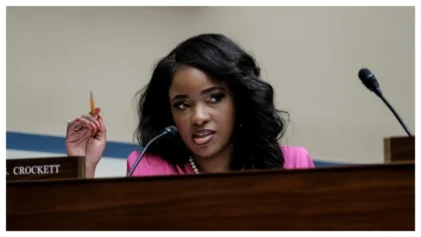One of Atlanta’s HBCUs is celebrating a comeback story 20 years in the making.
“If not for HBCUs, many of us would not be here today,” said Morris Brown President Kevin James said at a celebratory press conference last week.
The jubilation comes after years of overcoming a financial aid scandal by ousted former school officials convicted of fraud charges, leaving many students with worthless degrees. Now the college looks to the future with a hard reset full of expansion plans for a new school experience.
“This semester we have five students graduating so this will be our first accredited graduating class since 2003,” James said after announcing Morris Brown’s newly accredited status under the Transnational Association of Christian Colleges and Schools.
The liberal arts college located on Atlanta’s southwest side was a bustling part of the city’s network of ABCU schools known as the Atlanta University Center — that is, until 2002, when it lost its accreditation. That meant it could not apply for federal education funding often used for student financial aid, Pell grants and on-campus housing.
The college lost its accreditation initially granted by Southern Association of Colleges and Schools, Commission on Colleges while under the leadership of former college president Delores Cross who, alongside former financial aid director Parvesh Singh, were both sentenced to five years’ probation with home confinement after they pleaded guilty to a financial aid fraud scheme that began in the fall of 1999.
Cross and Singh engaged in blanket enrollment, meaning they counted students who were registered to attend classes as enrolled students even though not all the students labeled as enrolled attended classes, a necessary requirement to get federal financial aid money.
Ninety percent of students were on financial aid and the school received between $15 million and $25 million dollars in federal aid each year just before authorities stopped the fraud scheme, according to the Department of Education.
“We lost our accreditation due to some financial mismanagement, but it’s a new day and we’re not looking to the past, we’re looking to the future,” James said of the school’s troubled past.
James has been leading the school as president for the past three years. During the 20-year period, Morris Brown suffered a damaged reputation, lost some of its land and many students.
In fact, it went from averaging 2,000 students to roughly 80 as the school struggled to pay its debts. The school’s board of directors contemplated shuttering the school altogether, but James and his team have worked to turn things around with a “hard reset” as he calls it.
The Transnational Association of Christian Colleges started its process of accreditation last year, as it closely evaluated Morris Brown’s student instruction and serves as required by the Department of Education when seeking accreditation.
“I must admit it was a very heavy lift, $35 million dollar bankruptcy, we lost our land, we lost a lot of our students, but with the help of God, we’ve been able to restore this institution under this administration and we’re very excited to have done it,” James said.
Morris Brown currently has 70 students enrolled, four full-time faculty members and 15 staff, but James says with their accreditation restored, they hope to grow the school’s faculty and student populations.
“I will be one of the first graduating class from the new accredited Morris Brown College,” said Walter Jordan, one of the school’s current students.
Jordan, 51, is an Atlanta native and among the 70 students who will receive an accredited degree in business management once he graduates. He admits there was a time he was worried if his degree would be worth anything if the school failed to successfully complete its accreditation process.
“I was very worried and very concerned because I know no school that had ever lost its accreditation especially after a 20-year hiatus and was able to regain it,” Jordan said.
James says students who graduate in 2022 and beyond will have an accredited degree, but those who graduated with degrees during the 20-year span without accreditation remain unaccredited.
Students with unaccredited degrees are ineligible for federal financial aid. Other colleges may not accept their college credits and employers may not accept their degree as valid.
Looking to the future, James says the school plans a gradual expansion. “We have three umbrellas of programs, business, psychology, and music and we’ve implemented some new degree programs.
Hospitality management is one of the restored programs, and e-sports, and those are some bread-and-butter programs we feel will differentiate us from other institutions,” he said of Morris Brown’s future.


